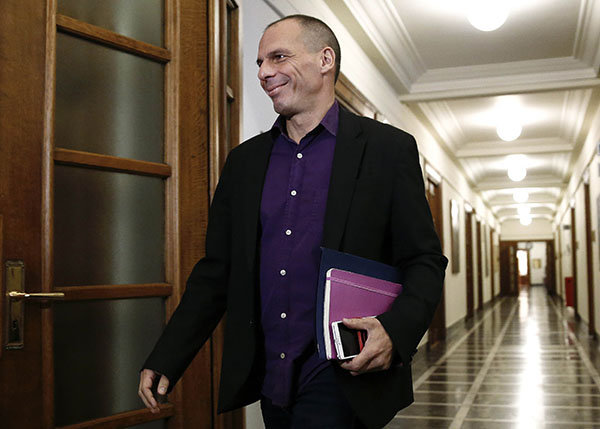Greece makes more concessions to euro zone, Germany sets vote
(Agencies) Updated: 2015-02-24 20:00
 |
|
Greek Finance Minister Yanis Varoufakis arrives for a government meeting at the parliament in Athens February 24, 2015. Greece's new leftist-led government climbed down further to euro zone creditors on its plans to halt privatisations, boost welfare and raise the minimum wage as markets rallied on the prospect of a four-month extension of its financial rescue. [Photo/Agencies] |
GERMAN VOTE REQUESTED
A Greek exit from the euro zone had not been discussed and was not on the table, Dijsselbloem said, adding that the only government that had held a meeting to prepare for a possible "Grexit" was in non-euro Britain.
In EU paymaster Germany, Finance Minister Wolfgang Schaeuble, who took the toughest line in the Greek negotiations, wrote to the speaker of the lower house of parliament requesting a vote this week on extending the bailout.
"Provided Greece avows its obligations and provided there is an agreement in the Eurogroup (of finance ministers), the German government would be in favor of the proposed extension," he wrote, according to business daily Handelsblatt.
Germany's rejection of an initial Greek request for a four-month loan extension last week forced Athens into a string of politically sensitive policy concessions, postponing or backing away from campaign promises to reverse austerity, scrap the bailout program and end cooperation with the "troika" of EU, ECB and IMF inspectors.
The letter said Greece would phase in collective bargaining with a view to raising minimum wages over time but promised that any changes would be agreed with its partners.
While leftist Prime Minister Alexis Tsipras has won broad support in his coalition for the deal clinched in Brussels, some hardline leftists have criticised it and the conservative opposition has charged that his illusions have been punctured.
In a televised address on Saturday, Tsipras called the accord a victory for Greece, but participants said Athens was isolated in the talks and forced to make humiliating concessions because its banks were running out of cash.
Latvia's central bank governor, a member of the ECB's policymaking governing council, cast doubt on elements of the Greek reform plan, such as tackling tax evasion and smuggling, questioning how much extra revenue they would raise.
"Those are soft measures, which may partly fill the budget gaps in the short-term, but (in the case of Latvia)nobody planned or budgeted it as permanent revenues," Ilmars Rimsevics told state broadcaster LTV.
Commenting on ongoing negotiations with Greece, he said: "For Europe, in a certain way, fatigue has set in, and this nursing and instructing all the time is also very burdensome."






